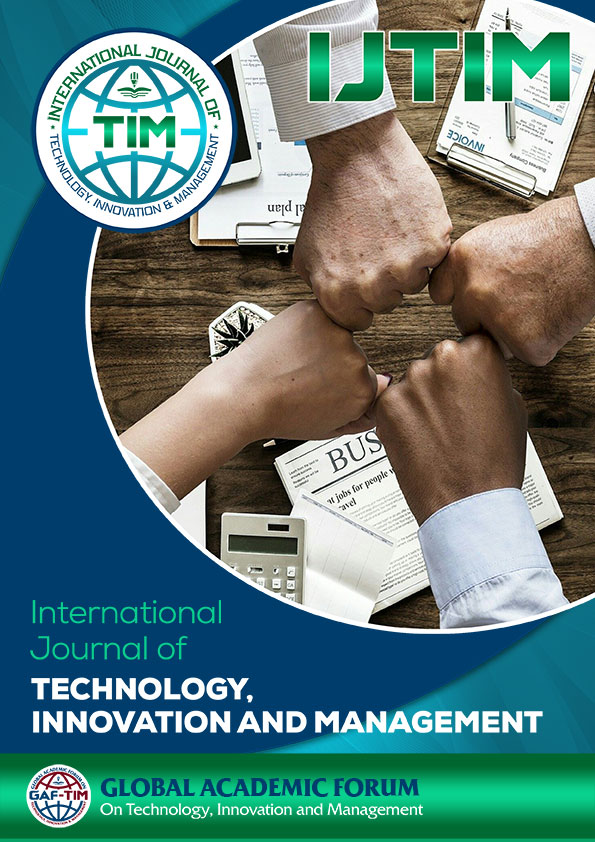AI-Powered Personalized Mobile Education for New Zealand Students
DOI:
https://doi.org/10.54489/ijtim.v3i1.210Keywords:
Artificial Intelligence, AI-Powered, Mobile Education, Design ThinkingAbstract
This research endeavors to develop and assess a customized mobile education system for students in New Zealand, employing the principles of artificial intelligence (AI) and user-centered design (UCD). The objective is to overcome the limited personalization observed in current mobile education solutions by offering tailored learning content and recommendations based on individual preferences, thereby accommodating the diverse requirements of students. A mixed-methods approach will be utilized, encompassing user research, persona development, user journey mapping, design, development, and evaluation. Participants, including New Zealand students, parents, and teachers, will actively engage in multiple research phases to ensure the effective implementation of user-centered design principles. By showcasing the potential of AI-driven personalization in enhancing the learning experience for students, this study contributes to the growing utilization of AI algorithms and systems within the educational context.
References
Abudaqa, A., Hilmi, M.F., Almujaini, H., Alzahmi, R.A., Ahmed, G., 2021. Students’ perception of e-Learning during the Covid Pandemic: a fresh evidence from United Arab Emirates (UAE). J. E-Learning Knowl. Soc. 17, 110–118.
Akour, I.A., Al-Maroof, R.S., Alfaisal, R., Salloum, S.A., 2022. A conceptual framework for determining metaverse adoption in higher institutions of gulf area: An empirical study using hybrid SEM-ANN approach. Comput. Educ. Artif. Intell. 3, 2.
Al-Hamad, M., Mbaidin, H., AlHamad, A., Alshurideh, M., Kurdi, B., Al-Hamad, N., 2021. Investigating students’ behavioral intention to use mobile learning in higher education in UAE during Coronavirus-19 pandemic. Int.
J. Data Netw. Sci. 5, 321–330.
Al-Mukhaini, E.M., Al-Qayoudhi, W.S., Al-Badi, A.H., 2014. Adoption Of Social Networking In Education: A Study Of The Use Of Social Networks By Higher Education Students In Oman. J. Int. Educ. Res. 10, 143–154.
Alhamad, A.Q., Akour, M.A., Al-Omari, F., 2012. Personalizing student’s profiles using JESS in A Learning Management System(LMS), in: 2012 International Conference on Interactive Mobile and Computer Aided Learning, IMCL 2012.
Alshurideh, M., Al Kurdi, B., Salloum, S.A., 2020. Examining the Main Mobile Learning System Drivers’ Effects: A Mix Empirical Examination of Both the Expectation- Confirmation Model (ECM) and the Technology Acceptance Model (TAM), Advances in Intelligent Systems and Computing.
Asmar, W.E.L., 2022. The Effectiveness of AI-Powered Digital Educational Platforms : Students ‘ Attainment and Teachers ’ Teaching strategies in a private high school in Dubai.
Criollo-C, S., Guerrero-Arias, A., Jaramillo-Alcázar, A., Luján- Mora, S., 2021. Mobile Learning Technologies for Education: Benefits and Pending Issues. Open J. Appl. Sci. 11.
Dai, C.-P., Ke, F., 2022. Educational applications of artificial intelligence in simulation-based learning: A systematic mapping review. Comput. Educ. Artif. Intell. 3, 100087.
Deka, P.P., 2015. A Study on Impact of Social Media on Educational Efforts in Guwahati City , Assam. Int. J. Adv. Res. Educ. Technol. 2, 0–4.
Fichten, Catherine, Jorgensen, Mary, Havel, Alice, Vo, Christine, Libman, Eva, Fichten, C, Jorgensen, M, Havel, A, Vo, C, Libman, E, 2022. AI-Based and Mobile Apps: Eight Studies Based on Post-Secondary Students’ Experiences.
J. Technol. Pers. with Disabil. Santiago, J 10, 97–114. Gamabri, I., 2022. A REVIEW OF ARTIFICIAL INTELLIGENT
FOR TEACHING , ASSESSMENT AND.
Goralski, M.A., Tan, T.K., 2020. Artificial intelligence and sustainable development. Int. J. Manag. Educ. 18, 100330.
Kharade, K., 2022. Promise, Threats, And Personalization In Higher Education With Artificial Intelligence Salinity measurement using FPGA View project Analytics with R View project.
Krull, G., Duart, J., 2017. Research Trends in Mobile Learning in Higher Education: A Systematic Review of Articles (2011 – 2015). Int. Rev. Res. Open Distrib. Learn. 18.
Liu, Y., Ren, L., 2022. The Influence of Artificial Intelligence Technology on Teaching under the Threshold of “internet+”: Based on the Application Example of an English Education Platform. Wirel. Commun. Mob. Comput. 2022.
Mcconatha, D., Praul, M., Lynch, M.J., 2008. Mobile learning in higher education: An empirical assessment of a new educational tool. Turkish Online J. Educ. Technol. 7, 15– 21.
Mirchi, N., Bissonnette, V., Yilmaz, R., Ledwos, N., Winkler- Schwartz, A., Del Maestro, R.F., 2020. The virtual operative assistant: An explainable artificial intelligence tool for simulation-based training in surgery and medicine. PLoS One 15, 1–15.
Mohtar, S., Jomhari, N., Mustafa, M.B., Yusoff, Z.M., 2022. Mobile learning: research context, methodologies and future works towards middle-aged adults – a systematic literature review. Multimed. Tools Appl.
Nazari, N., Shabbir, M.S., Setiawan, R., 2021. Application of Artificial Intelligence powered digital writing assistant in higher education: randomized controlled trial. Heliyon 7, e07014.















